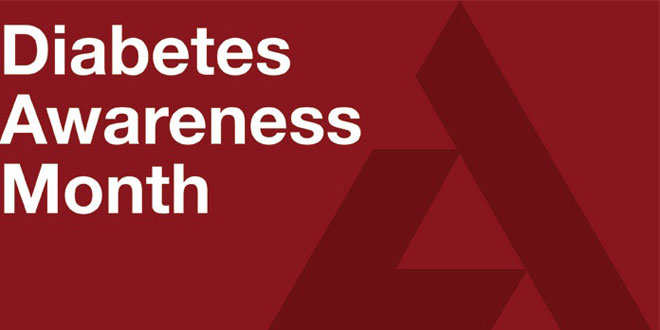
Diabetes Heath and Wellness
Diabetes, sounds innocuous enough. Diabetes occurs when your blood sugar or glucose level is too high. Insulin is the hormone that regulates your blood sugar. It is made in the beta cells in the pancreas. It helps your cells transport glucose inside to provide them with energy. Type 1 diabetes occurs when you do not make enough insulin. It usually starts in children and continues throughout life. Insulin is necessary for treatment and survival. Type 2 diabetes occurs when your body becomes resistant to insulin or you make less insulin as you get older. This causes less movement of glucose into the cells and the glucose stays in the blood stream. Gestational diabetes occurs when women are pregnant and less able to control their blood sugar levels. This can cause problems for mother and child.
The Center for Disease Control (CDC) estimates that over 29 million Americans have diabetes. Of that number, over a quarter are undiagnosed. Over 25% of people age 65 and older have diabetes and over 50% had prediabetes. African Americans, Hispanics and Native Americans are at greater risk for the disease.
Other risk factors for diabetes include
- Family history
- Obesity
- Lack of exercise or activity
- Age
- Poor diet
- Alcoholism
Diabetes can have many signs and symptoms that are non specific. These include
- Drinking large quantities of fluids
- Urinating large volumes
- Low energy and tiredness
- Sores that slowly heal or being more prone to infections
- Visual changes
You may not recognize some of these symptoms as they occur slowly and insidiously. Having a cut that takes longer to heal than in the past or tiredness in the afternoon may be signs of an elevated blood sugar and not just isolated occurrences. Urinating more frequently or more times at night may not just be a bladder issue. If you notice some of these symptoms, especially if you have risk factors, you need to see your health care provider for evaluation.
Over the long term, the high blood sugar levels damage the blood vessels and nerves and cause permanent damage to the eyes, kidneys, nerves, brain, heart, and extremities and erectile dysfunction. High blood pressure, smoking and high cholesterol are other risk factors for damaging blood vessels and increase the risk of injury from high blood sugar. The leading cause of death in the US is from cardiovascular disease. Maintaining a normal blood sugar removes one of these risk factors. This damage occurs silently and does not show up for years and after the damage is done.
The goal in diabetes treatment is to reduce blood glucose. Treatment involves
- Maintaining a healthy weight
- Regular exercise
- Diet
- Taking your medications regularly
- Monitoring your blood glucose
- Controlled alcohol intake
The best strategy to prevent or reduce the glucose intolerance is to maintain a healthy weight and watch your diet and exercise.
Obesity is one of the greatest risk factors for diabetes. It increases one’s insulin resistance and reduces our ability to move sugar into cells. Reducing the extra fat can improve glucose control with less or no medications by making the cells more sensitive to insulin. It also can reduce your cholesterol and blood pressure reducing the long term damage to our vascular system and organs. Getting up and active is the best way to reduce obesity.
Exercise burns the glucose and directly lowers blood sugar. It will cause more glucose to be taken up by cells and reduces the glucose in the blood. Aerobic activity such as walking, running, bicycling, swimming or rowing are all excellent ways to get up and moving. You need to start at the intensity level that you can manage and is safe for you. If you have health problems, consult with your health care professional to help organize an exercise program that is safe for you. .
Diet is very important in glucose control. Carbohydrates are sugars that are more or less complex. The more complex the carbohydrate is, the slower the sugar is broken down and absorbed by the body. The less refined the carbohydrate or grain is, the slower the glucose in it is digested and absorbed. This causes a slower rise of blood glucose. Refined grains such as white flour, white rice and degermed corn have had the fiber removed and allow the sugar to be more rapidly digested and absorbed and raise blood glucose faster. Whole grains containing the whole kernel and the extra fiber slows the breakdown and absorption of sugars leading to lower blood glucose peaks. This includes oatmeal, brown rice, barley, quinoa, whole wheat flour, buckwheat and other whole grains. .
Green vegetables are a better choice than starchy vegetables but you can eat small portions of starchy vegetables . Dairy is another good choice in moderation. Beans and legumes are an excellent source of protein and the fiber reduces the blood sugar spikes.
Alcohol and sweets can be used but in moderation and with good blood glucose monitoring. One or two bites or a low or no sugar dessert or one drink will have less effect on blood glucose. If you have any questions or concerns, you can always discuss with your health care professional or a nutritionist.
Even with all of these changes in behavior, you may still not be able to control your blood sugar without medications, either oral or injectable insulin. Your health care professional is the person to discuss this with you to allow you the best diabetes and glucose control.
No one wants to take more pills or inject themselves with insulin. No one wants to monitor their blood sugar multiple times a day and make dietary choices that they may not have made previously.
Diabetes is like a ninja, silent and deadly. You may feel well and go about your usual activities and not notice any problems and ask why do I need to follow a program for my diabetes. The complications of diabetes including blindness, heart attack, stroke, kidney failure, amputation and impotence are even worse problems to care for. You are worth the effort to do this. The changes that occur with diabetes are slow and take years to develop. You will have no or minimal symptoms initially. Once the damage has occurred, it is difficult if not impossible to fix.
A person very close to me had diabetes from his early 20’s. He did not take his diabetes seriously and would not monitor his glucose or be compliant with his diet or his medications. He also had high blood pressure and one day he found out that he was on the path to kidney failure. He then had to go on dialysis and went on the kidney transplant list. He was being evaluated for a kidney transplant and his heart was also found to be failing and needs a heart and kidney transplant. He ended up in the hospital on New Year’s Eve in heart failure and was told he could not leave until he received a heart and kidney transplant. 10 days later, a donor was found and he received his new heart and kidney. He now is almost 2 years after his transplant and is able to go to work, play and enjoy his granddaughter. He now takes his diabetes very seriously and monitors his blood glucose very closely and takes his medications regularly. He has done great.
The stealthy nature of diabetes allows the damage to occur with minimal symptoms until it is too late. Untreated diabetes can and will kill or maim you. This is a very serious health problem and is frequently ignored until it is too late. Do not ignore this. Take the time to take care of yourself. Get active and watch your diet and take your medication. YOU ARE WORTH IT!
About the author:
 Dr Schutz was born in Newport News, VA and grew up in Flemington, NJ. He attended New Jersey Medical School where he graduated in 1985. He completed his Urology Residency there in 1990. He completed a Urologic Oncology fellowship at the University of Colorado in 1991. He joined the faculty at the University of Arkansas in 1991. He became the Chief of Urologic Oncology at the University of Arkansas and Chief of Urology at the JL McClellan VA Medical Center in Little Rock during his tenure.He relocated to South Jersey in 1996 and formed Jersey Urology Group in 2006 with Drs Wren and Piskun. He was selected as a “Top Doc” in NJ Monthly Magazine. He is former President of the Medical Staff at Shore Memorial Hospital. He is a founding member of the American Society for Men’s Health and CoDirector of the Institute for Men’s Health. His clinical interests are Prostate, Bladder, Kidney Cancer and Testis Cancer and Men’s Health and lifestyle. He is the Health and Wellness consultant for Robert Irvine of the Food Network and writes a health and wellness blog for his website.
Dr Schutz was born in Newport News, VA and grew up in Flemington, NJ. He attended New Jersey Medical School where he graduated in 1985. He completed his Urology Residency there in 1990. He completed a Urologic Oncology fellowship at the University of Colorado in 1991. He joined the faculty at the University of Arkansas in 1991. He became the Chief of Urologic Oncology at the University of Arkansas and Chief of Urology at the JL McClellan VA Medical Center in Little Rock during his tenure.He relocated to South Jersey in 1996 and formed Jersey Urology Group in 2006 with Drs Wren and Piskun. He was selected as a “Top Doc” in NJ Monthly Magazine. He is former President of the Medical Staff at Shore Memorial Hospital. He is a founding member of the American Society for Men’s Health and CoDirector of the Institute for Men’s Health. His clinical interests are Prostate, Bladder, Kidney Cancer and Testis Cancer and Men’s Health and lifestyle. He is the Health and Wellness consultant for Robert Irvine of the Food Network and writes a health and wellness blog for his website.

